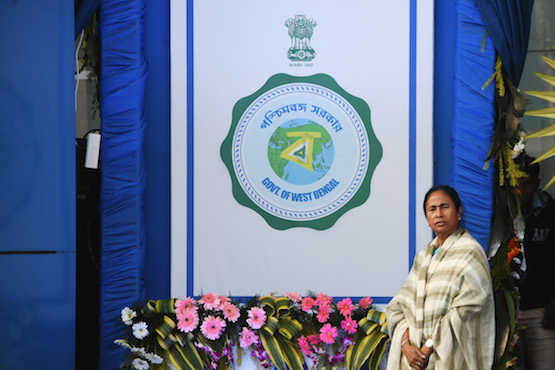
Mamata Banerjee launches the new West Bengal state symbol in Kolkata on Jan. 5. (Photo by Dibyangshu Sarkar/AFP)
India's West Bengal state, the seat of the imperial British in the 17th century, has always been politically different. Bengal intelligentsia ignited and powered Indian aspirations for freedom and the moves to establish a secular nation.
In contemporary India, while the rest of the nation gets embroiled in religiously biased politics, West Bengal continues to keep itself insulated from the electorally charged Hindu nationhood ideology despite most of its people following Hinduism devotedly.
The state, a bastion of Indian communists for three decades until 2011, has the potential to become a secular model for the rest of India, not least because the government is led by a woman determined to fight the religion-based politics of Hindu groups.
When Mamata Banerjee, the chief minister of West Bengal, led three massive agrarian agitations in 2007 and 2008 to reclaim farmland taken for industrialization, one thing was evident — she stood against the high and mighty industrialists and the then powerful Communist Party of India (Marxist), the ruling party in the state.
Her non-violent movement helped her Trinamool (grassroots) Congress party, a faction of India's "grand old" Congress party, win elections by trouncing the powerful communists in the 2011 state elections as she became chief minister.
Banerjee's party and her allies won 227 seats, while the ruling party CPI (M) was left with merely 40 seats in the 294-seat house. The spinster's victory brought an end to the 34-year-old communist reign in the state.
The long rule of the Communist Party had a positive impact on the state: religion was kept out of politics and governance, while the state did not want to interfere in the religious sentiments of the people and did not allow any religious group — majority or minority — to take the law into its own hands and paralyze the security of the common people.
This was evident by the fact that the emerging communally biased pro-Hindu Bharatiya Janata (Indian people's) Party did not secure even a single seat in the state election in 2011. Thanks to frantic attempts by the pro-Hindu party cadres in contesting all 294 seats, the party was able to get six seats in 2016 state elections as against the 211 seats secured by Banerjee's party.
Many believe that most of the so-called communal clashes which have taken place in the state in the past year, including the clashes between Hindus and Muslims, indicate certain unidentified persons trying to incite religious sentiments among the people.
Decoding the communal clashes, a news portal indicated the surreptitious use of social media to spread hate in all these places, and it is not difficult to see a hidden hand trying to paralyze the communal harmony the state had been enjoying for decades.
Banerjee has been equally favorable to all religious groups in the state. Her affection for St. Xavier's University and College in Kolkata is well known.
She is also equally favorable to the Ramakrishna Mission. She has shown great sensitivity to the needs of the Muslims by helping Haj pilgrims, providing state assistance to build cemetery walls and helping with funds for madrasa education.
The atmosphere is ripe for people of goodwill to strengthen bonds of fellowship with people of all faiths and to ward off slow poisoning by communal forces.
Anyone who cares for building a harmonious community should find ways to win the confidence of truly spiritual, peace-loving, humanitarian religious groups and find common platforms to combat communal poisoning.
Banerjee was quick to assure that in times of trouble a religious group should feel safe and secure in the state and that the law of the land will protect them from any unusual coercion by external forces. This is something that is very much needed when religious minorities feel threatened.
True development can take place only when leaders go above their personal religious or social biases and build bridges between people of different socio-cultural religious groups. Banerjee can feel at home with people of all religions. This is one sure way how she can keep religious fundamentalism out of bounds in Bengal.
Julian S. Das SJ, is a journalist based in Kolkata, capital West Bengal state. He formerly directed Chitrabani, the Jesuit communication center in Kolkata.


